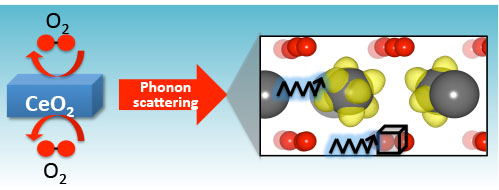The thermal properties of oxides are of interest for a number of important applications, including thermoelectrics, thermal barrier coatings, memristors, and fuel cells. MIT MRSEC researchers demonstrated, for the first time, the controllable impact of oxygen defects on the thermal conductivity of a reducible oxide. The thermal conductivity was modulated by varying the concentration of oxygen vacancies and reduced cations in oxide thin films treated under different annealing conditions. Changes in the oxygen non-stoichiometry led to a 50% reduction in thermal conductivity (from k = 6.62±0.61 to 3.82±0.51 W/m-K). This work demonstrates the ability to reversibly vary the thermal conductivity of a given material by control of oxygen non-stoichiometry and thus points to the possibility for in situ control of phonon transport via control of the oxygen vacancy concentration.